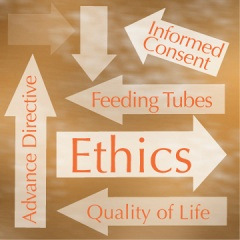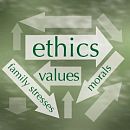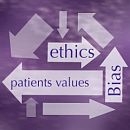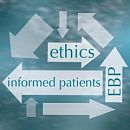Sale thru 7/31/25
Dietary Recommendations, Feeding Tubes And Ethical Practice #e107
Presenter: Paula Leslie, PhD, FRCSLT, CCC-SLP
Learn how ethical principles and research evidence can support clinicians and families in making informed decisions.
– E.H., prior course participant
Read more comments about this course!
This course combines knowledge of feeding tubes in dementia with informed consent and decision making. Discussed are the requirements for informed consent, and how knowledge of ethical principles and research evidence can support clinicians and families in making more informed decisions.
Comparison of student and clinician knowledge of how feeding tubes help and hinder does not always align with the evidence. This has implications for student education and early clinical training. Even when clinicians are aware of the evidence, personal bias may influence our contributions to decision making. If we are aware of this we can do something about it. This leads to advance care planning and formats for formalizing discussions.
Course is offered for 0.1 ASHA CEUs – 1 Contact Hour.
Course Overview – Run Time: 1:13:13
- Feeding tubes, dementia, and the evidence.
- Knowledge of what feeding tubes can and cannot do compared between students and clinicians.
- Advance care planning to aid with decision making.
- Three conditions for informed consent.
- Applying medical ethics to family decision making regarding tube feeding.
- Mediating family goals.
– R.K., prior course participant
Read more comments about this course!
The content of this online CE course does not focus exclusively on any specific proprietary product or service. Presenter financial and non-financial disclosures may be found in the Presenter & Disclosures area.
Video PowerPoint presentation with author narration & downloadable handout. Stop and re-start the course at any point. Learners retain access to course content after completion for ongoing reference and review.
Reviews
"Speaker was very knowledgeable." T.S. (Mar. 2025)
"Clear, organized presentation. The entire discussion is applicable to my job as a medical SLP." C.L. (Mar. 2025)
"Informed consent was beneficial to discuss. This course met my ETHICS requirement." N.B. (Mar. 2025)
"Case studies were helpful as they were similar to my current patients." J.V. (Mar. 2025)
"The discussion about discordance between what a clinician understands and would choose personally vs. what they would recommend for a patient was beneficial. I liked that the course was available when I had time to take it." S.B. (Feb. 2025)
"I liked the discussion on consideration for caregiver opinions, but not to override the patient's preference. I appreciated the discussion related to autonomy, true understanding of outcomes, and feeling like I am offering patients and caregivers best practice as well as compassion." H.B. (Jan. 2025)
"The discussion about making sure that the pt is able to make their own informed decisions was beneficial. I liked the presenter's calm, gentle way of teaching. Also her accent." K.D. (Dec. 2024)
"It was helpful to discuss how to give advice but not pressure decision-making. Easy to follow, interesting, well organized." K.M. (Dec. 2024)
"Complex ethical decision-making in feeding tubes was beneficial to discuss. Good pacing and interesting topic." M.B. (Dec. 2024)
"It was helpful understanding that peg tubes do not prevent aspiration. I liked the clear tone and articulation of how SLPs view tubes and dementia." C.R. (Dec. 2024)
"Beneficial discussions regarding most recent research. The presenter was knowledgeable and delivered information in an engaging way." A.C. (Dec. 2024)
"SLP boundaries with decision making at end of life were beneficial to discuss. As well as the legality implications of SLP recommendations." R.P. (Dec. 2024)
"Discussion of feeding tubes and autonomy was helpful. I liked the online modality and real-world examples." J.S. (Nov. 2024)
"Ethics behind peg tubes was beneficial to discuss. I like how applicable the course is to everyday practice." H.M. (Nov. 2024)
"I liked the details about financial vs healthcare POA as well as the information about our scope of practice." E.D. (Nov. 2024)
"Interesting course." C.L. (Nov. 2024)
"Patient autonomy was beneficial to discuss. I enjoyed the evidence-based information." M.C. (Oct. 2024)
"The discussion of advanced directives was beneficial. The course was informative." S.A. (Sep. 2024)
"The updated ASHA guidelines were helpful. I liked the course format." B.P. (Sep. 2024)
"Patient considerations in clinical decision-making were helpful. I liked the organization and flow of the course." M.F. (Aug. 2024)
"Beneficial clarification of what is/isn't in our scope of practice and what we are responsible for conveying to patients and caregivers. I liked the case study examples and clarity surrounding certain issues. I appreciated the reference to the website detailing state-by-state advanced directives." E.C. (Aug. 2024)
"Living wills, autonomy and agency for patients were beneficial topics. The presenter was straightforward and knowledgeable." E.S. (Aug. 2024)
"I loved the case studies- is the cancer patient's daughter avoiding imminent death, is the drug addicted son hoping for early death for inheritance? Did dad know both of these scenarios in choosing son as HCDPOA? So much to think about. The importance of being able to share our expertise in lay-terms. Appreciated links to state specific HC proxy, etc. THOUGHT PROVOKING." M.C. (Aug. 2024)
"Beneficial to discuss ethical decision making and the limitations of the SLP in their scope of practice regarding recommendations to the patient and family. The emphasis upon SLP's initiating education of the family and patient prior to their making the decision regarding end-of-life care." R.A. (Jul. 2024)
"Legal aspects of dealing with feeding tubes. I liked the case studies." S.G. (Jun. 2024)
"Liked the information regarding advanced directives versus living wills. I liked the students' and practitioners' views on feeding tubes." T.S. (Jun. 2024)
"Description of the legal terms involved with advanced directives and living will are helpful. I liked the case examples." J.W. (May 2024)
"Our role in recommending PEG tubes and outcomes was beneficial to discuss. I enjoyed the comparison between student SLPs and SLPs in the field." C.T. (Apr. 2024)
"Considerations for medical decision-making for feeding tubes were beneficial. This course was informative and research-based." A.B. (Mar. 2024)
"The informed consents were beneficial to discuss." D.M. (Mar. 2024)
"The course was clear, to the point, with relevant examples to bring the information to life. It was beneficial discussing to be aware of personal bias including in delivery /tone of education." E.I. (Mar. 2024)
"SLP scope on tube feedings was a helpful topic. The course was easy to understand." W.B. (Mar. 2024)
"The encouragement to stand our ground and keep in mind that we must stay within our scope of practice no matter the pressures we face. I liked the definitions of the legal terms/resources provided to reference." C.G. (Mar. 2024)
"It was helpful to discuss how to deal with families and caregivers when the patient cannot make medical decisions for themselves. I liked the structure and easy-to-understand explanations." A.A. (Mar. 2024)
"I've gained an increased legal understanding." R.C. (Dec. 2023)
"I benefitted from hearing how to go about having certain difficult conversations with patients and their families. The specific case examples were helpful." M.S. (Dec. 2023)
"I liked the topic on informed consent. I liked that the course was self-paced." K.O. (Dec. 2023)
"The review of advanced directives was helpful. I liked the information on differences between SLPs and students of feeding tube necessity." P.R. (Dec. 2023)
"The information was all very interesting. I liked the education with mild cognitive impairment." C.O. (Dec. 2023)
"The legal aspects were helpful. A topic I'm learning more about." C.E. (Dec. 2023)
"I enjoyed the course content." J.M. (Nov. 2023)
"All of the content was beneficial and I appreciated the case studies at the end." H.B. (Sep. 2023)
"Quick and easy. Learning the criteria for informed consent." C.C. (Sep. 2023)
"The discussion of SLP role/scope of services, including SLP obligation to inform the need for families and physicians to make actual decisions, was beneficial. I liked the review of autonomy, informed consent and disclosure, and case discussions." J.A. (Sep. 2023)
"I liked the info about consequences of feeding tubes and misconceptions clinicians have. The case studies were interesting." C.A. (Aug. 2023)
"I will provide more education now and request the patient to "teach back" what they understood. I liked the presenter." M.M. (Aug. 2023)
"Ensuring SLP remains within scope of practice. And the importance of family education." V.C. (Jul. 2023)
"The presenter clearly explained concepts and provided examples. Specifying my role in consulting with those who have questions about their care." A.C. (May 2023)
"I liked the case studies and discussion of when a person is non-cerebral and does not have a living will." C.C. (Apr. 2023)
"Practical application. Examples were beneficial." M.C. (Apr. 2023)
"Really enjoyed the overall presentation. Very informational and knowledgeable presenter." M.K. (Mar. 2023)
"Course was very thorough! I learned how to “stay in my lane” while providing clinically relevant information to the treatment team to aid in discussions regarding feeding tubes, without being felt pressured to be the one to make the recommendation." C.C. (Mar. 2023)
"Discussion of ethical principles was beneficial." A.T. (Feb. 2023)
"Risks and benefits of feeding tubes." J.K. (Feb. 2023)
"Taking into account the patient's wishes and the patient/family understanding of disease and treatment." G.J. (Feb. 2023)
"Practical content. Learning legal definitions was beneficial." K.A. (Feb. 2023)
"I liked the real-life examples. Discussing research-based evidence with regards to benefits and risks of feeding tubes." K.P. (Dec. 2022)
"Very applicable to the medical SLP." S.A. (Dec. 2022)
"Discussion of differences between similar terms like competence and capacity. I liked the discussion of complex topics." W.K. (Dec. 2022)
"Real-life case study examples. Discussion of the SLPs role and scope of practice when it comes to informing and educating patients and families about the swallowing mechanism paired with other factors in order for the doctor and the patient/family to ultimately make the decision for feeding tube or not." M.B. (Dec. 2022)
"I enjoyed the patient-centered perspective included in this course as it pertains to the care we are providing. I also enjoyed that course went specifically into consent and competency which was not an area that I consider often or expected to be included." K.M. (Dec. 2022)
"Very informative and easy to listen and attend to the speaker. Understanding consent, living will and our professional role." M.D. (Nov. 2022)
"I liked the organization of the content and clinical case studies. Learning how to educate the patient and family in a way that they can make an informed decision." J.L. (Nov. 2022)
"Addressing family concerns via education. Better understanding of SLP scope of practice with regard to recommendations that can/cannot be made. Recognizing the difference between POA and HCP. Liked the case study examples with recommended plans of action for each one." M.B. (Oct. 2022)
"The breakdown of the different types of legal documents was beneficial." L.L. (Sept. 2022)
"I now have additional knowledge of PEG tubes and ethical issues." B.G. (Sept. 2022)
"This course was easily understandable and interesting although outside of my caseload. Knowledge is shown in the ability to present learned material in layman’s terms." T.W. (Sept. 2022)
"I liked the topics of feeding tubes and advanced dementia." L.G. (Sept. 2022)
"This entire course will benefit my daily practice as I work in acute care facilities and this is a topic that I encounter daily." S.W. (Aug. 2022)
"I liked the manner in which the information was stated. In the hospital setting the physicians do want the therapists' to make the recommendations for feeding tubes. It is refreshing to know that I can stand my ground that they need to make that decision." M.R. (Aug. 2022)
"Learning I need to involve family more - education and involvement of the health care PofA." M.H. (Jul. 2022)
"Good refresher on decision making process involved in using a feeding tube." J.H. (Jul. 2022)
"Simple and direct. I liked the real life examples of the family and team helping to decide what is best for the patient." D.B. (Jun. 2022)
"I liked the duration and the case studies. Learning the difference between different legal documents as well as difference between autonomy & beneficence." M.W. (Jun. 2022)
"I liked the discussions of informed consent, beneficence, disclosure, and autonomy." R.J. (Mar. 2022)
"Functional and realistic information provided." A.W. (Feb. 2022)
"Patient scenarios included were very helpful." M.C. (Feb. 2022)
"I liked how patient-centered it was while emphasizing the relationship between autonomy and beneficence." S.S. (Jan. 2022)
Course Objectives
- Compare student and SLP knowledge of feeding tubes in advanced dementia.
- Identify the three conditions for informed consent.
- Integrate medical ethics into family decision making regarding tube feeding.
Presenter & Disclosures
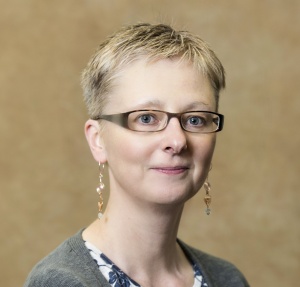
Paula Leslie, PhD, FRCSLT, CCC-SLP, is a professor and director of the Doctor of Clinical Science in Medical Speech-Language Pathology. She maintains full clinical licenses in the USA and UK where she is a Specialist Adviser to the Royal College of Speech & Language Therapy in swallowing disorders. She provides support to researchers and provides continuing education from grassroots to international level and across the health professions on complex clinical decision making, ethics, and end of life decisions in vulnerable populations. Her honors include the Honors of the Association Southwestern Pennsylvania Speech-Language-Hearing Association, the American Speech-Language-Hearing Association DiCarlo Clinical Achievement Award, the Pennsylvania Speech-Language-Hearing Association Clinical Achievement Award, and Fellow of the Royal College of Speech & Language Therapists (UK).
Speaker Disclosures:
Financial — Paula Leslie is a presenter of online CE courses sponsored by Northern Speech Services; receives royalties.
Nonfinancial — Paula Leslie has no relevant nonfinancial relationships to disclose.
Intended Audience / Accreditation

This program is offered for 0.1 ASHA CEUs (Intermediate Level; Professional Area).

Intended Audience
- Speech-Language Pathologists
ASHA CEUs:
Northern Speech online courses are registered with ASHA and are offered for ASHA CEUs. The number of ASHA CEUs is noted above. Note that 0.1 ASHA CEU = 1 contact hour = equals 1 CEE.
Earning ASHA CEUs and the ASHA CE Registry:
To earn CEUs from this course and have ASHA CEUs submitted to the ASHA CE Registry, course participants must satisfy each of these requirements:
- Participants must meet the eligibility requirements to earn ASHA CEUs (see below).
- Participants must indicate – prior to course completion – their intent for Northern Speech to submit this course to ASHA.
- Participants must complete/view this course in its entirety.
- Participants must complete the course post test with a minimum of 80% accuracy.
- After successful completion of the post test and completion of the course evaluation, a certificate of course completion is presented to the participant electronically via PDF.
- For those participants who indicated their intent for the ASHA CE Registry, course completion status will be submitted by Northern Speech to ASHA within 45 days of the course completion date.
Eligibility To Earn ASHA CEUs:
Attendees must meet at least one of the following conditions in order to be eligible to earn ASHA CEUs:
- Current ASHA Member.
- ASHA Certificate of Clinical Competence (CCC) Holder.
- Licensed by a state or provincial regulatory agency to practice speech-language pathology (SLP) or audiology.
- Credentialed by a state regulatory agency to practice SLP or audiology.
- Credentialed by a national regulatory agency to practice SLP or audiology.
- Engaged in a Clinical Fellowship under the supervision of an individual with their ASHA CCC.
- Currently enrolled in a master's or doctoral program in SLP or audiology.
If an attendee is not an ASHA member or CCC holder but meets any of the above criteria, they may inform the ASHA CE Registry of their eligibility by visiting this site.
ASHA CE Registry:
During the enrollment process, if you select to receive ASHA credit for this course and if you provide your ASHA number, Northern Speech will automatically submit your CEU information to the ASHA CE Registry after successful course completion (80% on post test). This submission happens once per month, during the first week of the month. For example, if you complete your course on November 7th, Northern Speech will submit all November online course CEUs to ASHA during the first week of December. When ASHA inputs the information into their database, they will mark the course as completed on the last day of the month in which it was completed, so November 30th using this example. The certificate of completion available for you to print immediately, however, will reflect the actual completion date, November 7th in this example. Due to ASHA processing procedures please allow 2-3 weeks, from the submission date, for the course to appear on your ASHA transcript.
Licensing Boards: Most state licensing boards DO accept CEUs earned online (usually classified as home-study credits). Some state boards do, however, place a limit to the number of credits that can be earned via home study/online courses. For the most current information, we suggest that you contact your licensing board or agency to verify acceptance policies and/or any credit limits related to home-study courses prior to registering for this course.
Additional accrediting agencies by which Northern Speech is an approved CE provider:
- California: NSS is approved as a provider of continuing education by the California Speech-Language Pathology & Audiology Board. Provider #PDP4. Online CEU limits may apply; please contact SLPAHADB for current online CEU acceptance policies.
- Iowa: NSS is approved as a provider of continuing education by the Iowa Board of Speech Pathology and Audiology Examiners. Provider #169.
- Kansas: NSS is approved as a provider of continuing education by the Kansas Department of Health and Environment. Provider #LTS-S0005.
Frequently Asked Questions
Customer Support: Please phone 888.337.3866 or email info@northernspeech.com.
Course Completion Timeframe:
You have unlimited time to complete our online courses. You may log off and log on as often as you’d like to in order to complete all sections of a course.
However, completion dates are based on Eastern Standard Time. Therefore, if you need your CEUs by a certain date, be sure to complete the course test before 11:59pm EST on that date. For example, if you need CEUs before January 1st, you will need to complete the course test before 11:59pm EST on December 31st.
Content Access:
Access to course materials and content does not expire, even after completing the post test. You may continue to review course material by logging into your NSS account, clicking the My Online Courses tab, and then viewing your desired course.
Certificate of Completion:
On successful completion of the post test (80%), a certificate will be immediately available for download and/or printing. This certificate will include your name, date of completion (based on Eastern Time Zone, USA/Canada), and number of contact hours (CEUs / CEEs). Please note that CEUs are awarded on the date of successful test completion, not the date of course enrollment. Please ensure that you successfully complete the post test prior to any licensure renewal dates.
ASHA CE Registry Submission:
During the enrollment process, if you select to receive ASHA credit for this course and if you provide your ASHA number, NSS will automatically submit your CEU information to the ASHA CE Registry after successful course completion (80% on post test). This submission happens once per month, during the first week of the month. For example, if you complete your course on November 7th, NSS will submit all November online course CEUs to ASHA during the first week of December. When ASHA inputs the information into their database, they will mark the course as completed on the last day of the month in which it was completed, so November 30th using this example. The certificate of completion available for you to print immediately, however, will reflect the actual completion date, November 7th in this example. Due to ASHA processing procedures please allow 2-3 weeks, from the submission date, for the course to appear on your ASHA transcript.
Purchase Orders:
Purchase orders are currently not accepted for online orders, if you wish to submit a purchase order please do so at info@northernspeech.com or fax to 888-696-9655.
What is an Online Course?
Our Online Courses consist of video, audio, and/or text content and are offered for ASHA CEUs. Unlike a webinar, which requires participants to be logged on and at a computer at specific times, our Online Courses are available to you at any time, from any device, via your NorthernSpeech.com online account. You may work at your own pace and start and stop your course as you wish. Your course will conclude with a short post test. On successful completion of the post test (>80%), a printable certificate of completion is presented to you.
Receiving CEUs:
Northern Speech is an ASHA CE Provider and our online courses are registered with ASHA and offered for ASHA CEUs. Please note that successful completion of the online post test is required prior to the awarding of CEUs. Please contact your state licensing board for acceptance policies related to CEUs earned online. Please note that courses offered for university students are not applicable for CEUs.
Registering for an online course:
You may browse all online courses by clicking the Continuing Education tab above, then Online Courses. Once you find a course, click Enroll Now, and you will be asked to either log into your existing Northern Speech account or create a new online account. Once you’ve entered your account information and provided your credit card payment, your course will be immediately available to you.
Accessing your purchased course or returning to a purchased course:
You will be able to access your online course by logging into your Northern Speech account and then clicking the My Online Courses tab on your profile screen. Click the course you would like to start or to resume. From there, proceed through the course sections until you are ready to complete the post test. You do not have to complete your course all at once. You may log on and off as you wish.
Testing requirements:
Each online course concludes with a post test consisting of multiple choice or true & false questions. Scores of 80% or greater are required for successful course completion and awarding of CEUs. You may revisit course materials and retest as needed to achieve a passing score.
Number of CEUs offered:
We offer courses from 1 to 21 contact hours. Each course will note the number of CEUs offered. Please note that 0.1 CEU = 1 contact hour = 1 CEE.
State licensing boards and online CEUs:
NSS is an ASHA CE Provider and most state licensing boards DO accept ASHA CEUs earned online (usually classified as home-study credits). Some boards do, however, place a limit to the number of CEUs that can be earned via home study/online courses. For the most current information, we suggest that you contact your licensing board or agency to verify acceptance policies and/or any CEU limits related to home-study courses prior to enrolling in an online course.
Course formats:
Our course formats include: text, audio, video, and PowerPoint with author narration. Each course will note the format on the course description page. Most courses include closed captioning.
Course handouts:
Most of our online courses provide a link to download the accompanying handout as a PDF file.
Group discounts:
Groups of 3 or more are eligible for a 20% discount on each registration on most of our online courses. To receive this discount, registrations need to be processed together via the "Group Rates" tab on the Online Course of your choice.
Computer requirements:
For our online courses to function best, we recommend that you update your computer to include the newest version of your Internet browser (Safari, Chrome, Firefox, Edge, Internet Explorer, etc.) and newest version of your computer's operating system. Also a high-speed Internet connection is recommended (cable or DSL). Speakers or headphones will be required for many of our courses as many contain audio components.
Course Cancellation Policy:
A purchased online course can be exchanged, refunded, or transferred to another individual if contact is made with NSS (via phone or email) within 30 days of purchase and the course materials have not been viewed or downloaded.
Special Needs:
Please click here for any special needs requests, and we will do our best to accommodate them.
| Contact Us |

